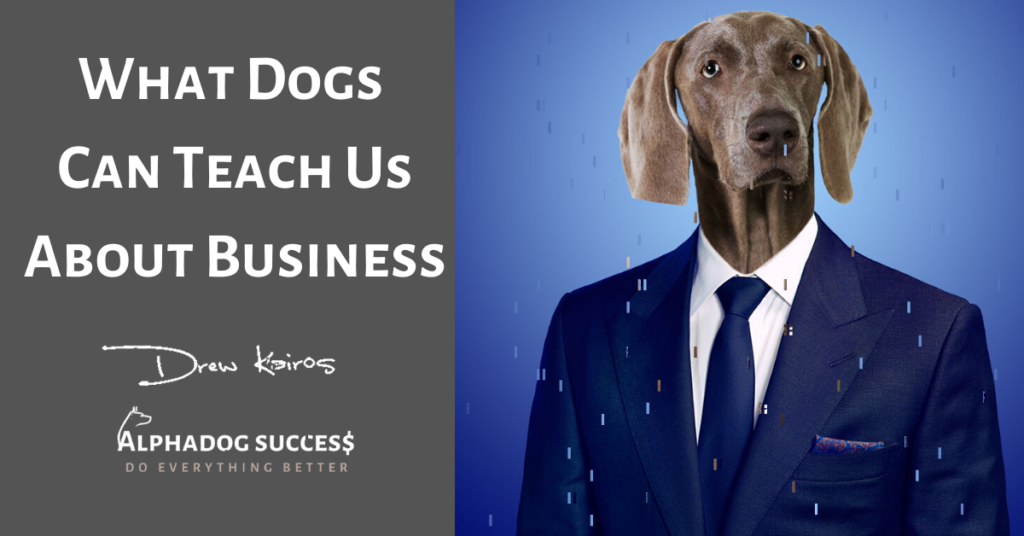If you think about the way we describe life as a dog: “It’s a dog’s life,” “I’ve been working like a dog,” “It’s a dog-eat-dog world,” and “They treat me like a dog,” to name a few. You’d think they have horrible lives…
The fact is, if they’re not mistreated, dogs actually have great lives. Not only that, they’re usually way better at their jobs and happier about their lives than we humans are!
No, I’m not smoking something, at least not today. I’m serious. I’ve had dogs most of my life. I’ve been trained by some of the best dog trainers around before I became a trainer myself. Yes, I know how that sounds, but the truth is, training dogs is more about training their owners than the dogs. Anybody can give a dog commands, but without the proper confidence, demeanor, compassion, etc. the dog may choose not to listen.
If that sounds at all similar to training managers so employees are more effective, then you’re beginning to see the analogy. In fact, there are lots of business and life lessons we can learn from dog behavior and our relationships with “man’s best friend”.
Dogs know the secret to personal productivity.
They get tons of rest, yet they’re highly productive. If you need them, they’re there – bright-eyed and bushy-tailed. That’s because they’re incredibly focused and disciplined. Dogs know their priorities and they stick to them. They keep it simple and they’re happier as a result.
Entitled dogs are more trouble than they’re worth.
Spoiled dogs can be whiny, manipulative, over-protective and aggressive. If they don’t get what they want – what they’re used to getting – they act out. Entitled people often do the same thing. They behave badly and are much less productive than their counterparts. In a hierarchical relationship, the Alphadog is always a compelling, compassionate, and confident manager who can lead his/her employees.
Most dogs love to work and serve.
The bond between man and canine evolved as a symbiotic working relationship. There’s actually an entire class of “working dogs” that includes Shepherds, Rottweilers, Boxers and Mastiffs. They’re at their best when they’re put to a task and can be anxious when they think they’re not needed. The problem is that owners are often lousy leaders that don’t communicate what they want their dogs to do. The same issue can arise in business. You may have some hard-working employees, but unless they know the tasks to complete to be most effective, they’re not productive.
Dogs don’t overextend themselves.
People will often over-promise and under-deliver. Not dogs. They never bite off more than they can chew, so to speak. If you give them too large an area to guard or more work than they can handle, you’ll quickly notice signs of stress, noncompliance or other unwanted behavior. There’s no hubris or ego matters with dogs. They know what they can handle and will do just that.
When they’ve been socialized, dogs have successful relationships.
When dogs aren’t properly socialized or allowed to spend time out and about with other dogs and people, they can be anxious or aggressive when they interact. Usually this is based on fear and the unknown. People are often the same way. Troubled working and personal relationships are usually a sign of a troubled upbringing. Good leaders, or alphas, will always help with social integration and productive applications in a new environment.
Dogs are direct and genuine.
When they’re happy, they wag their tails. When they’re appreciative, they lick your face. If they feel bad, they drop their heads and may tuck their tails. When they want to play, they’ll get a toy and drop it at your feet or jump around spiritedly. If they feel threatened, their hair goes up or they may growl. Their communication is direct and genuine. There’s no drama, hidden agenda or passive-aggressive behavior, as with humans. To become a good leader, or alpha in your workplace, learn to lead by example.
Dogs don’t sweat the small stuff.
Partly because they have short memories. If they’re chastened for doing something bad, as soon as you forgive them, they move on. It’s the same thing if you mistreat them. Say you’re sorry, scratch them behind the ears, give them some love and it’s like it never happened. They’re great at letting go and never hold grudges on things they can’t control. One way to implement this in your business or personal life is with the 5 by 5 rule. If it’s won’t matter in 5 years, then don’t spend more than 5 minutes upset by it.
Owners usually misidentify the culprit.
When dogs misbehave, people inevitably blame the dog. In reality, it’s almost always the owner’s fault (poor training, limited socializing, over-extended domain, no alpha/leadership presence). It’s the same thing in the business world where 90 percent of problems are management-related. The only difference is drama…dogs never point their paws at each other or blame someone else for their behavior.
Let me take this a step further…
If you’re good with domesticated animals – I’m willing to bet you’d make an effective manager and have some true leadership potential. It’s at least worth the experience. If you don’t want to get a coach, try getting a dog and a trainer instead. You’ll be amazed what you will learn.
As always, I’m here for questions, comments, concerns, as well as for coaching and additional training…just reach out!
~ Wishing you success!

Throughout my life there have been fundamental beliefs, ideas and principles that have helped me achieve success in many respects. I’ve benefited from many different schools of thought and learned from mentors of all different backgrounds and philosophies. The way I live my life and the concepts I teach are a reflection of these different points of view.



